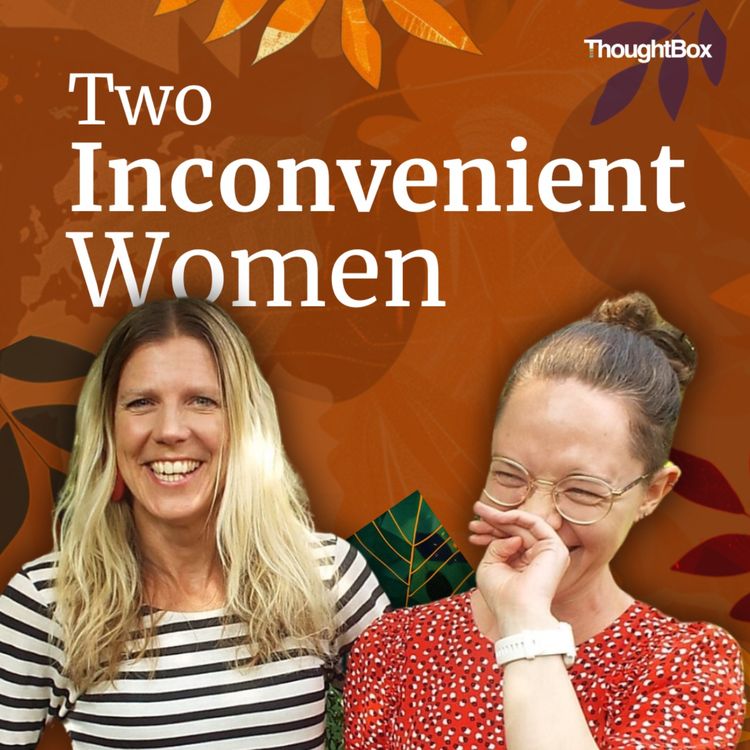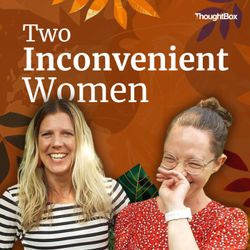Share

Two Inconvenient Women
Exploring the inconvenience of systems thinking
In the final of this 'triplet' of podcasts, Holly and Rachel are this week talking about the inconvenience of systems thinking.
From the very get-go at ThoughtBox, we've had systems thinking as one of the three pillars of our work to encourage a deeply relational experience of the world (Thinking, Feeling, Connecting) by connecting with others, connecting with the wider world, and feeling deeply connected with ourselves.
Thinking in systems has started being given a lot of attention - you can take multiple courses in systems-thinking, whilst systems-change is all the range. But what is a system? What does it mean to transform systems? And what is systems thinking anyway?
This week we unpick the inconvenience of systems thinking by going right back to the roots and appreciating how this is not a 'thing to learn about' but simply how life works. We are all of us part of infinite, interconnected systems and 'thinking in systems' simply means knowing and noticing the connections that we are a part of and influenced by. This is as simple and as profound as it gets.
In this episode we reference the following:
- Donella Meadows - Thinking in systems (website / book)
- The Blind men and the elephant parable (video)
- Transforming Leadership Course (website page)
- Nostrils & systems - Chapter 1: The Story of Triple WellBeing - Rachel Musson (free ebook)
- Donut Economics - Kate Raworth (website, book, framework)
- How Wolves Change Rivers (video)
- Manfred Max-Neef - Human Needs Matrix (video)
- Gross National Happiness (alternative to GDP) - (website / approach)
- Peter Senge - introduction to systems thinking (video)
- 'From Domination to Restoration' - Jon Conradi (article)
- adrienne maree brown and Toshi Reagon (Octavia's Parables podcast)
More episodes
View all episodes

2. Are we in a polycrisis and what can we do about it?
55:29||Season 5, Ep. 2When the world feels overwhelmingly complex, it is often hard to know where to put our energy; which 'crisis' to give our attention to as it were. You may have come across the term 'polycrisis' as it's fast becoming part of the public lexicon. It's not a particularly cheery term, but it is helpful in making sense of the many interconnected and overwhelming crises that we are facing in our lives. The polycrisis is characterised by feedback loops where one crisis exacerbates another, making simple, isolated solutions ineffective. Which is the greatest inconvenience we face when trying to address them. And yet diagnosing the crisis is the first step to addressing it - and this term is useful in doing just that. In this episode, we wrangle with the complexity of the times we're living in through the frame of the polycrisis; tapping into what we can appreciate from the framing of a 'metacrisis' at the same time, and how looking at changing our perspective on the world is a powerful way to focus on meeting the symptoms and addressing the root cause of a world in crisis. We reference the following during the conversation:Reconnection Retreat - ThoughtBox & Hawkwood College (in-person gathering)The Story of Triple WellBeing - Rachel Musson (free PDF)The Metacrisis is a crisis of meaning - Ernesto van Peborgh (article)Triple WellBeing Practitioner Course (online training course)Tasting the Pickle: Ten Flavours of Metacrisis and the Appetite for a New Civilisation - Jonathan Rowson (essay)
1. Is it really a new year? Is it really a new me?!
54:33||Season 5, Ep. 1For many in the world - those following the Gregorian calendar - January 1st marks the beginning of a new year. Midst the celebrations, revelry and resolutions is often an unspoken expectation of 'newness'. Pressures exist to have "resolutions" that make us somehow a better, fitter, happier, healthier version of ourself. But to what extent do we need this? To what extent do we want this? And to what extent is now the time for 'a fresh new world' anyway?In this week's episode of Two Inconvenient Women, we explore some of the different cultural celebrations for new year, thinking about how they map to the seasons, nature's rhythms or stories that other influences. We discuss the difference between having resolutions and intentions and how one can be a real support and guide, whilst the other can often feel like a burden or self-inflicted prison. We unpack some of the ways that new year has been coopted by a consumer culture fixated on 'bigger, better, shinier' and what this may be doing to our sense of ease. We think about what it means to be a 'new you' and whether a process of growth and becoming is a wiser step into a new year, rather than setting ourselves a goal to arrive at which has ever-moving goalposts.
18. A New Year's Gift: Poem for a New Year By Matt Goodfellow
02:25||Season 4, Ep. 18Poem for a New YearBy Matt GoodfellowSomething’s moving in,I hear the weather in the wind,sense the tension of a sheep-fieldand the pilgrimage of fins. Something’s not the same,I taste the sap and feel the grain,hear the rolling of the rowanringing, singing in a change.Something’s set to start,there’s meadow-music in the darkand the clouds that shroud the mountainslowly, softly start to part.
17. A Christmas Gift: Stories of Triple WellBeing
52:20||Season 4, Ep. 17We're taking a break over the holidays and are not recording a new episode of Two Inconvenient Women today. Instead, we're sharing a gift - a whole range of stories of inspiring people from across the world working to create a healthier future for people and planet. From educators in Uganda focused on self-care in leadership to teachers challenging the mainstream to communities focused on nature connection at the heart of learning, our Triple WellBeing Fellows are ordinary people with extraordinary stories.Dive into the whole community and begin your listening journey: https://thoughtboxeducation.com/stories
16. Why is gratitude so powerful?
56:04||Season 4, Ep. 16We begin each podcast episode with a moment of gratitude. But why so? Much more than a 'nice thing to do', the practice of gratitude is ancient - part of wisdom traditions across the world and deeply embedded into spiritual and religious practice. It is a way of strengthening our own sense of resilience and presence, finding meaning in the world and feeling more grounded, connected and present in the world. But what does it actually mean to be grateful and how can this practice shape the very structure of our brains?In this week's episode we explore the topic of gratitude, asking the question: Why is gratitude so powerful? In this episode we reference the following:Healing begins with gratitude - Joanna Macy (Article)Grateful Living (website)
15. Why don't we talk to our neighbours?
57:45||Season 4, Ep. 15Why don't we talk to our neighbours? This question is asked not to be provocative but more to reflect on what has shifted in our cultures to mean that we can inhabit the same space as people we don't quite know. For some cultures around the world, community and neighbourhoods remain a vital - and vitalising part of daily life, yet for many living in the culture of modernity, our move into hyper-individualism has been at the detriment of our community. We may not have ever met the person or people who live above, below or beside us - and we may not know anything about them - not even their name. In this week's episode we explore some of the changes across time that have led to the erosion of gathering spaces; the impact of a culture of fear and distrust on how we respond to strangers and some of the blocks, challenges and opportunities that surround us when it comes to finding connection with those in our neighbourhood.In this conversation we reference the following:Love Thy Neighbour - World Values Survey (PDF)Everyone wants a village but no-one wants to be a villager - Cassie McCure (article)36 questions - how to fall in love - New York Times (website)
14. Do we really want to be successful?
54:57||Season 4, Ep. 14Are you successful yet? When do you know you've "made it"? And - more importantly - is it a place that we actually want to be 'arriving'? Many of us are living in cultures that have a dominant story of success - often associated with wealth, prosperity, career-ladders and progress. Our mainstream education systems teach us how to jump through the hoops on the journey towards success, and our media is filled with advertising and stories of what success looks like (normally glossy, shiny and always slightly out of reach). But who gets to decide when we've become successful, and is it worth it?In this week's episode we explore the notion of success, thinking about what it means, who grants us the title and what the possibilities are to look beyond the mainstream story and carve out a different approach to life. We explore questions such as: What happens when we don't fit the story or mould of what success looks like? What might it mean to carve out our own version of 'success'? What can we learn from failure? And what if, rather than a destination we arrive at, success is simply a way of living well?In this episode we reference the following:Steve Cutts - illustrator, satirist (website) Life & Music - Alan Watts (cartoon)
13. Are your values lived or laminated?
01:07:43||Season 4, Ep. 13Many people find themselves working within organisations or structures that don't necessarily practice the values that are being preached (or laminated, advertised or promoted). It can feel deeply uncomfortable when our actions are out of line with the values we hold within us, and yet it is often not our choice to have to at in ways that contradict our values. Bit what are values? Where do they come from, and how do we connect with the values that shape our lives so that we can align actions and intentions with integrity and authenticity.In this week's episode we explore the values that shape our lives, our cultural stories and the world we're living in; thinking about how to align with our own authentic self and some of the tools and practices we can tap into in order to help shape our lives through the direction of our inner 'north star'.In this episode we reference the following:Common Cause Foundation (website / organisation)Schwartz Values Map - Shalmon Shwartz (article)Rebecca Solnit - writer & activist (website)SMSC & British Values - Department for Education (website)Rutger Bregman on Veneer Theory - Big Think (video)Why you are not as selfish as you think - BBC Future (website)
12. Why doesn't sustainability seem to be working?
01:06:29||Season 4, Ep. 12The sustainability movement has been going since the 1950s, and ‘sustainability’ is now part of mainstream narrative, awareness and growing action. Yet when sustainability continues to be seen and introduced into organisations as an add-on rather than a process or foundation, how much change is it actually supporting? In this week’s episode we explore the inconvenience of sustainability, thinking about where positive change has been enabled, the impact of greenwashing; what some of the limitations may be and what opportunities are emerging for wider-level transformation when sustainable is understood as a ‘verb rather than a product. In this episode we reference the following:There You Go - Survival International (short cartoon)Earth In Mind - David Orr (book)Schumacher College - Education College & movement (website)Inside COP: Is The US Still In? - Outrage & Optimism (podcast)Indigenous protestors demand to be heard - Washington Post (news video)Earthshot Prize - Global mission & award (website)